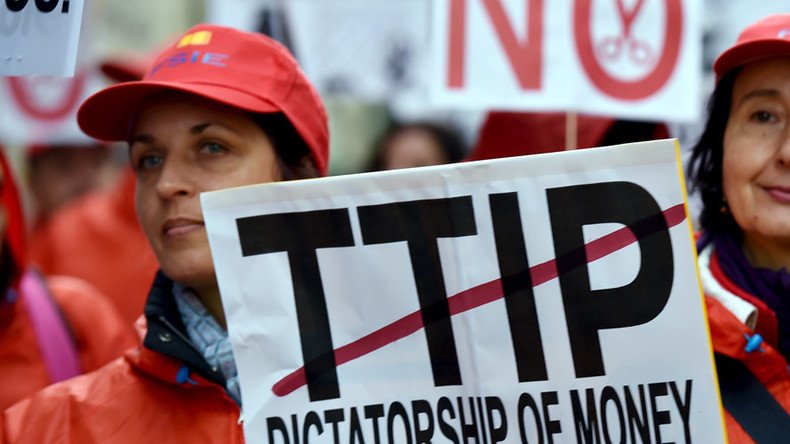‘Corporate power grab:’ Govt’s refusal to release TTIP documents sparks outrage

The government’s refusal to publish sensitive information that could reveal the negative impact TTIP might have on Britain’s health service has been condemned by campaigners, who warn the EU-US trade deal is undemocratic.
While proponents of TTIP say the trade agreement will modernize trade tariffs and reduce regulatory constraints on exporters, critics say it amounts to a corporate power grab.
'Shrouded in secrecy'
Amid secretive negotiations in Brussels, campaigners have called upon the government to come clean about TTIP's implications for Britain’s public health service.
Transparency campaigners submitted a Freedom of Information (FOI) request to the government earlier this month, requesting detail on how private health firms can sue the government if their profits are undercut by Whitehall’s policy changes.
Clear words about #TTIP from @JosephEStiglitz while at #wef 2016 pic.twitter.com/yKD8lXnqP7
— Stop TTIP (@eci_ttip) January 25, 2016However, business secretary Sajid Javid refused to release the information on the grounds its disclosure could prevent civil servants from seeking adequate advice from lawyers.
The director of Global Justice Now, Nick Dearden, condemned Javid’s decision, but said it was unsurprising.
“Sadly it’s not surprising that the government is choosing to block access to TTIP documents when the whole process has been shrouded in such secrecy,” he said.
“Politicians are constantly telling the public that there is nothing to be concerned about, but then go to great lengths to prevent any sort of public scrutiny as to the nature of the negotiations.”
Dearden said that corporate lobbyists have discussed TTIP with the European Commission (EC), yet ordinary citizens who are worried about erosion of public services, consumer standards, and the environment are being consistently shut out.
“Even MEPs have found it very difficult to get access to relevant documents,” he said. “The extreme secrecy surrounding TTIP is one of many pieces of evidence that this is a corporate charter being cooked up behind closed doors to the detriment of democracy and the interests of ordinary people in the EU.”
'Putting public at risk'
Central to TTIP is an Investor State Dispute Settlement (ISDS), which will allow corporations to sue foreign governments if they introduce policies that undermine the companies’ profits. A controversial tool in international law, the mechanism has led to mammoth pay-outs from governments, as corporations wage legal battles against states.
In one particularly controversial example, US tobacco giant Phillip Morris took legal action against the Australian government after it introduced mandatory plain cigarette packaging. The firm is also embroiled in a $25 million lawsuit against Uruguay’s government in a bid to stop it from enlarging health warnings on cigarette packaging.
In October, leaders of nearly every major political party in the UK backed an appeal to stop the NHS from becoming part of TTIP.
The appeal, which was organized by a trade union called Unite, aimed to remove the public health service from plans laid out in TTIP amid fears its inclusion could lead to Britain’s public health service being privatized by American healthcare firms.
#BusinessAgainstTTIP grows daily - almost 150 businesses in a week say #NoTTIP! https://t.co/ao4IWblvAX#ISDS#TTIPpic.twitter.com/fJIqrZ48qr
— War on Want (@WarOnWant) January 25, 2016A British campaign called Businesses Against TTIP has gathered momentum in recent months, as greater numbers of business speak out against the secretive trade agreement.
The campaign, which has attracted over 150 firms from across the UK, says TTIP will allow some of the world’s biggest corporations to undercut EU environmental and social standards.
“The overwhelming majority of British businesses do not export at all to the USA. TTIP has been designed by and for the largest corporations that trade and invest across the Atlantic, not the majority,” the campaign says.
“The European Commission’s official study predicts that the EU will suffer at least 680,000 job losses as a direct result of TTIP – putting our employees and our businesses at risk.”












